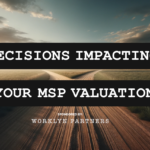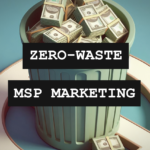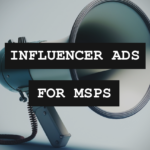Get Answers to These Must-Know Questions Before Hiring an IT Marketing Company
The Managed Services industry is growing quickly and looks as though it will continue to thrive for years to come. One major contributor to this upward trend is the marketing specialization that is occurring in the channel. Most small market MSPs do not have the internal resources necessary to market themselves and generate leads. This means they are forced to rely on outside vendors for this type of service. Up until recently, there were only a handful of MSP marketers and lead gen companies dominating the industry. Now it appears that a new brood has arrived and is looking to take on the challenge of marketing Managed Services. While there is some serious marketing talent out there that is well worth tapping into, there are just as many actors that don’t know “diddly squat” about IT. Here are some questions to ask your prospective marketing vendors so you don’t get burned.
Do you specialize only in Managed Services/ Business IT Marketing?
Marketers frequently use highly contextual content in order to decrease conversion costs. The long term benefit of this has been proven to offset the resource time it takes up-front to produce loads of content specific to a niche audience. This means that if you hit a landing page for a marketing company claiming to focus on Managed Services, it could be very likely that they have 25-50 similar landing pages framed around other industries. It is important to know if they truly specialize in MSP marketing or if it is just one of many B2B verticals that they service. This will give you a barometer of how well they know the industry.
Do you contract with multiple customers in the same service area?
Most of the well respected marketing vendors in the IT Channel will only work with one or a few MSPs per service area. This ensures that they are not over serving one area and self-competing. If you do not have exclusivity in a service area with your marketing vendor, you can still have a successful campaign. However, in this case, there would be nothing preventing your biggest competitor in territory from hiring the same firm and start a budget war. It is important to know the vendor’s stance on this and how they work with competing Service Providers.
Do you guarantee a specific amount of appointments?
I can tell you from experience that MSP marketing is not easy. What works for some providers sometimes doesn’t translate to others. This is why MSP marketing companies often require a 3-6 month minimum commitment so that they can work out the kinks and optimize your campaign for success. In the event that this time comes and goes and there is little to show for it, you should know what kind of guarantee the vendor offers. If you were guaranteed 5 appointments per month and you only averaged 3 appointments per month for the first 6 months, you should be compensated for the difference.
Local Buzz For MSPs: 27 Ways To Generate Buzz w/ No Ad-Spend
Sponsored by ZEST
What is the average cost per appointment set?
One of the major benefits of working with an IT specific marketing vendor is that their experience will lend performance data that can be used to gauge your success. This takes a great amount of risk out of the capital investment you put into starting the campaign. If they are operating similar campaigns for other Service Providers, they are likely to know the average cost to the MSP to acquire an appointment. Some vendors even simplify this and charge a flat rate per leads which takes even more of the risk away from your investment. Regardless of pricing structure, it is always important to get a rough estimate up front.
What is the average closing ratio on sales appointments?
Similar to the average cost per appointment, the marketing vendor should also have an idea of what the closing ratio is on appointments generated through their service. To be fair, this is entirely reliant on the MSPs sales people and their handling of the leads. Regardless, the vendor should still be able to give you some insight into how their best customers perform and their worst customers perform on closing the appointments. Assuming you will fall somewhere in the middle would give you a fair expectation of the results you may achieve.
What is the typical length of sales cycle for leads generated?
Asking your marketing vendor to give you an idea of how long the sales cycle is for their leads is a great way to find out how well they know the industry. Everyone that knows the industry understands that the cycle is long. It can take months to pry customers away from their current provider, no matter how bad they want to transition. If you get an answer that reflects anything less than 30-90 days, it is certainly worth questioning. Good marketing providers will understand this pain point and will give you an appropriate expectation.
Local Buzz For MSPs: 27 Ways To Generate Buzz w/ No Ad-Spend
Sponsored by ZEST
Are the prospects exposed to my brand prior to contact?
Some lead generation companies doing PPC, SEO and Automation will use their own “brand” to generate leads. For example, they set up a site called “NYC IT Providers” and then get customers to complete a form to receive a free quote. This way the marketing vendor can have complete control over the content and doesn’t have to rely on the MSP’s brand for conversion. While strategy has proven to work over the last decade, it also means that the prospects have no idea who your company is before you contact them. This means you have start the sales process further up the funnel. If not nurtured thoroughly, these leads will convert far less than leads generated with exposure to your brand.
Who owns the marketing content that is produced for campaigns?
Understanding who owns the content that is produced for campaigns can give you an added advantage to using one marketing vendor over another. If you are working with a good agency, they will likely produce some high quality marketing content that can be used to sell your services. Some companies will let you use the materials freely after they are produced and others do not. This is also important if you work closely with the vendor to develop content custom to your campaign. For example, you might offer your expert insight to create a great piece on password security. If they own the content after it is produced, they could technically use it for their other MSP clients.
Who grants final approval on all content used to generate leads?
It is important for the long-term success of the campaign for you (the MSP) to have final approval on all content used in the campaign. This is not only important for brand integrity, but it is also confirms who is primarily responsible for the customer’s expectations should they contract your services. The last thing you want is for the marketing provider to mislead your customers through the materials or verbiage they present. This could be an intentional tactic to increase lead conversion or a misunderstanding resulting from a lack of product knowledge. Either way it is a situation that you certainly should avoid by ensuring you get final approval up-front.
Is there any residual benefit to using the service?
As someone that always takes the long-view on things, I always like to know what the residual benefits are for taking actions. This can also be helpful when hiring a marketing vendor for your MSP business. It is important to understand what (if any) long term benefits you have from the services they provide. For example, if your provider is using PPC campaigns to generate leads on Google and Social Media, could you continue to manage and fund these campaigns yourself if you no longer work with them? Understanding what assets you can expect to get from the campaign will help you better gauge your return on investment and what options you have if things don’t work out.
Who owns the data collected during the campaign?
If your marketing vendor is using list-building or lead-gen tactics, you are likely going to generate opt-in data by running the campaign. Some telemarketing and marketing automation firms will also use third-party B2B data for use in your campaigns. It is important to understand what the limitations are for your use of the data, since it is either integrated or generated from the campaigns that you are paying for. For example, if you can continue to manage and utilize a newsletter list even after the marketing service contract expires, it gives you another residual benefit. It also ensure that the marketing vendor can’t use that data for other customers should you terminate your contract with them.
What are your KPIs and reporting frequencies?
Agreeing on key performance indicators and setting up routinely scheduled reports will keep both parties accountable during the marketing process. If you are considering working with a vendor and they do not offer any type of ongoing reporting, it is not unreasonable to demand that they provide monthly reports. The truth is, people rarely read reports, so I would recommend coming up with a few important metrics (KPIs) and leave it at that. If the reports are complicated to provide or difficult to understand than they won’t help anyone. The data should be simple and actionable and give you a 60 second read on the overall health of the campaigns.

SPONSORED BY ZEST

















